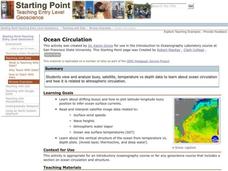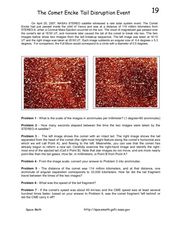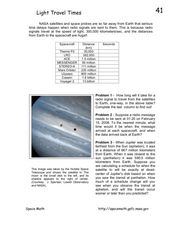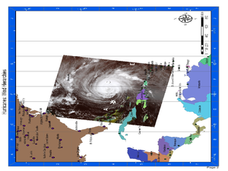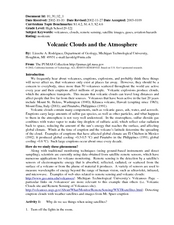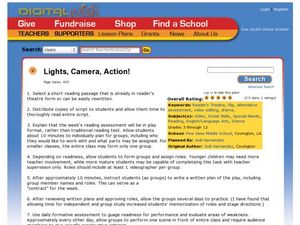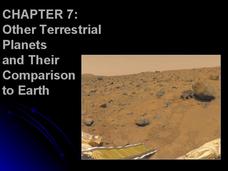Curated OER
Global Greenup
Students utilize satellite images to track the life cycle of vegetational growth over a large area. Animal migratory patterns are compared to this cycle.
Curated OER
Ocean Circulation
Students view and analyze buoy, satellite, temperature vs depth data to study about ocean circulation and how is related to atmospheric circulation. They read and interpret satellite image data related to: Surface wind speeds, Wave...
Curated OER
Jupiter and Io
In this Jupiter and Io worksheet, students use a diagram of the planet and its moon to find the dimension of the image, the width of the largest feature in the atmosphere of Jupiter, the width of the smallest feature in the atmosphere of...
Curated OER
The Comet Encke Tail Disruption Event
In this comet tail disruption instructional activity, learners solve 7 problems using two images from NASA's STEREO satellite showing the breakup of the comet's tail. Students analyze the diagram and use the scale to solve the problems...
Curated OER
The Mathematics of Ion Rocket Engines
In this ion rocket engines learning exercise, students read about how heavy atoms are used to create the thrust in rocket engines. They solve 5 problems including determining the speed of atoms in a satellite, finding the average...
Curated OER
Light Travel Times
In this travel time of light activity, students read about the NASA satellites and space probes that transmit radio signals at the speed of light across huge distances. Students solve 3 problems about data transmission from space to...
Curated OER
Geography: examining the Glacial Features of Cape Cod
Students examine satellite images of the glacial features of Cape Cod. They analyze where human activity is located in terms of those features. Students make models of the features, including kettle holes. They also use contour maps...
Curated OER
Data Corruption by High-Energy Particles
In this data corruption by high-energy particles, students solve 4 problems about the solar flare that corrupted the imagers measuring them. Students find the speed of the arriving particles and the percentage of light-speed the...
Curated OER
Pan's Highway-Saturn's Rings
In this Pan's highway worksheet, students read about the Cassini spacecraft that discovered how Pan clears out the ring debris in the outer A-ring system of Saturn. Students use an image taken by the satellite to find the scale of the...
Curated OER
Water Resources
Students study water resources that are important to the people of North American and Africa. They use satellite images and data to explore how human actions can degrade, improve, or maintain water resources. They analyze and interpret...
Curated OER
Causes and Effects of ENSO
High schoolers analyze monthly sea surface temperature data from the Pacific Ocean to determine if the period is an El Nino or a normal year. They recognize signs to see if there are any patterns that signal either occurrence. Satellite...
Curated OER
Hurricane Winds: A Spatial Hierarchy of Processes at Different Scales
In this earth science lesson, students study a satellite image of hurricane Isabel and write answers to 5 questions that follow. They match predictions to the map locations.
Curated OER
Ocean Currents and Sea Surface Temperature
Students use satellite data to explore sea surface temperature. They explore the relationship between the rotation of the Earth, the path of ocean current and air pressure centers. After studying maps of sea surface temperature and ocean...
Curated OER
Shrinking Rainforests
In this rainforests worksheet, students study satellite images and rainforest facts. They complete 8 short answer questions that follow.
Curated OER
Volcanic Clouds and the Atmosphere
Young scholars examine how scientists monitor volcanoes. In this volcano lesson students complete several activities including why we see things when using satellites.
Curated OER
Seeing a Dwarf Planet Clearly: Pluto
In this dwarf planet worksheet, students use images from the Hubble Space Telescope and they determine the scale of the image, they identify the largest features in the images, they calculate the volume of Pluto and they create a model...
Curated OER
Lights, Camera, Action!
Students explore various images and recognize that in order to make a visible image using a camera or using our eye, light is required. In small groups, they observe how the eyes respond to changes in light and record their observations...
Curated OER
Black Holes...V
In this black hole worksheet, students read about the black hole in the center of the Milky Way Galaxy called Sagittarius A and observe a Chandra image of the area where the black hole exists. Students solve two problems which include...
Curated OER
What Are We Looking At?
Learners investigate different perspectives through a farming simulation. In this photo perspectives lesson plan, students examine different photographs taken by satellite or from ground level. Learners then discuss the differences and...
Glynn County School System
Terrestrial Planets
Mercury, Venus, Earth, and Mars are collectively known as the terrestrial planets. Although part of the same group, each planet has its own set of characteristics. Scholars explore the characteristics that make the planets unique and...
CK-12 Foundation
Location on the Earth: Longitude and Latitude
To what degree do learners understand coordinates? Get them some practice in Yosemite National Park in a simple, fun interactive. Pupils explore a map and locate coordinates of popular sights within the park, then answer questions...
Exploratorium
Hot Spot
Not only does a concave mirror focus light waves, it can also concentrate infrared radiation into a hot spot. If you have a small electric heater and such a mirror, demonstrate this for your physical science class.
Columbus City Schools
Keeping It Hot!
Hot off the presses, this collection of thermal energy activities, lessons, and printables is sure to amaze. Demonstrate how thermal energy moves about in a system using simple materials. Pupils demonstrate their understanding...
NOAA
How Do We Know?: Make Additional Weather Sensors; Set Up a Home Weather Station
Viewers learn about three different weather measurement tools in installment five of the 10-part Discover Your Changing World series. They build weather vanes to collect data on wind speed, barometers to determine air pressure, and...

